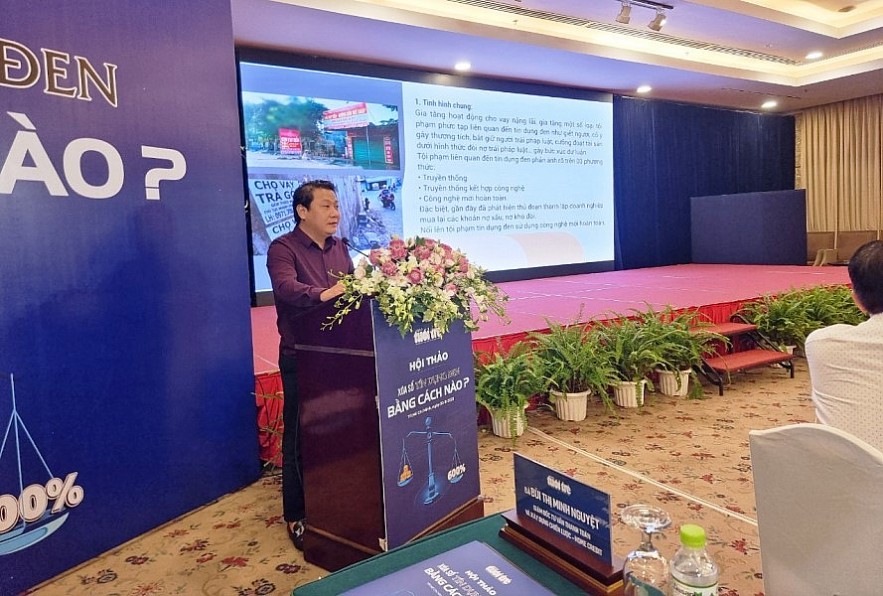(TBTCO) – On the morning of November 30, in City. Ho Chi Minh held a seminar “How to eliminate black credit?”. The event was organized by Tuoi Tre Newspaper, aiming to find effective solutions in eliminating black credit, while helping people more easily access official consumer credit channels.
The workshop was attended by representatives of the Criminal Police Department, the People’s Public Security Communications Department (Ministry of Public Security), and the Civil Law Department (Ministry of Justice); State bank; Lawyers, economic experts…
 |
| Lieutenant Colonel Le Vinh Tung – Deputy Head of the Major Case Department of the Criminal Police Department (Ministry of Public Security), information on the results of the fight against black credit crimes. Photo by Do Doan |
Arrested thousands of subjects related to black credit
Information about the fight against black credit crimes at the conference, Lieutenant Colonel Le Vinh Tung – Deputy Head of the Major Crimes Department of the Criminal Police Department (Ministry of Public Security) said that the crime situation related to black credit is occurring. complex variables. In the past year, the Police Investigation Agency prosecuted 538 cases with 944 defendants; administratively sanctioned 305 cases with 396 subjects; of which 485 cases were prosecuted with 772 defendants for lending at high interest rates in civil transactions; prosecuted 27 cases with 35 defendants for intentionally causing injury, 17 cases with 108 defendants for property theft…
Through the fight against black credit crimes, the police also discovered foreigners (Chinese, South African, Russian, Latvian) coming to Vietnam to establish, purchase, and hire people to act as business owners. Pawnshop, consulting, financial business, recruiting staff to use high-interest lending applications and websites, with interest rates of over 1,000%/year.
 |
| Discuss effective solutions to eliminate black credit at the conference. Photo by Do Doan |
| Cumulatively in 4 years (2019-2022), the police agency has discovered 3,772 cases/6,810 subjects of black credit activities; prosecuted 2,113 cases/4,343 defendants related to black credit. The Criminal Police Department in particular has coordinated with many localities to fight and handle crimes with new methods and tricks, operating in the shadow of businesses, intertwining many fields and areas. Especially property rape cases in Tien Giang, City. Ho Chi Minh, Hanoi… In particular, the Criminal Police Department has destroyed two cases of subjects using high technology to operate black credit activities. |
In particular, the police recently discovered a trick of individuals establishing businesses including financial companies, businesses, and law firms, then buying back bad debts and bad debts, then calling and texting them. threats to confiscate property.
“Taking advantage of the police department’s crackdown and drastic handling of calls and text messages threatening debt collection to confiscate property as above, a situation has emerged of some borrowers from banks, Credit institutions, mainstream financial companies… deliberately “delay” in repaying debt. Even on social networks, many closed groups post articles and instructional videos, soliciting ways to “explode debt” when borrowing through applications of banks and financial companies, affecting credit activities. official application” – Lieutenant Colonel Tung informed.
 |
| Representatives of the Ministry of Justice proposed solutions to fight against black credit crimes. Photo by Do Doan |
Reduce loan interest rate ceiling, increase penalties
According to a representative of the State Bank, outstanding consumer credit of financial companies is decreasing sharply, about 40% compared to the end of last year. As of the end of September, the total outstanding loans of financial companies were only VND 134,000 billion. Meanwhile, bad debt on consumer loans increased by 10-15%, making financial companies reluctant to lend.
For the consumer finance market to develop healthily and sustainably, Dr. Le Thi Hoang Thanh – Deputy Director of the Department of Civil and Economic Law (Ministry of Justice), proposed the need to build a legal framework to enhance borrowers’ obligations to credit institutions and take effective measures. effectively and strictly so that the borrower must properly fulfill its obligations and cannot be sluggish.
 |
| Overview of the seminar. Photo by Do Doan |
According to Lieutenant Colonel Le Vinh Tung, competent authorities should consider amending the provisions of Article 201 of the Penal Code (crime of lending at high interest rates in civil transactions) in the direction of increasing the penalty corresponding to the amount of money. gain illegal profits.
At the same time, the State Bank advises competent agencies to promulgate, amend and supplement legal documents in banking fields that are easily exploited by subjects for black credit activities such as online loans. , peer-to-peer loans, payment intermediaries, e-wallets, investments, financial services business…
”The Criminal Police Department continues to advise the Ministry of Public Security to direct police units and localities to promote professional prevention, promptly detect, verify, prosecute, investigate, and prosecute. Trial of crimes related to black credit activities…” – Mr. Tung affirmed.
| According to Dr. Le Thi Hoang Thanh – Deputy Director of the Department of Civil and Economic Law (Ministry of Justice), there needs to be regulations limiting loan interest rates and loan management fees to balance the legitimate interests between borrower and lender. Reference to international experience shows that in Japan, the ceiling interest rate on consumer loans is 20%/year. In India, consumer loan interest rates range from 12 – 48%/year; in Brazil it is 30 – 70%; In the US, only about 8 – 36%/year; China applies from 10 – 40%/year. |
